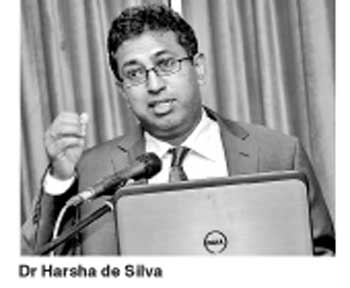Thursday Feb 19, 2026
Thursday Feb 19, 2026
Saturday, 18 November 2017 02:04 - - {{hitsCtrl.values.hits}}
 Deputy Minister of National Policies and Economic Affairs and Leader of the Sri Lanka delegation yesterday emphasised that the Universal Periodic Review of Sri Lanka was an important process which has drawn 230 recommendations.
Deputy Minister of National Policies and Economic Affairs and Leader of the Sri Lanka delegation yesterday emphasised that the Universal Periodic Review of Sri Lanka was an important process which has drawn 230 recommendations.
Following are the full remarks by Deputy Minister Dr de Silva at the Adoption of the Working Group Report of the third Cycle of the Universal Periodic Review of Sri Lanka- Geneva, 17 November 2017:
I would like to begin by saying how much Sri Lanka welcomed the opportunity of its third Universal Periodic Review, to be able to demonstrate the importance that Sri Lanka attaches to human rights, under the National Unity Government’s Vision towards building a stable, peaceful, reconciled and a prosperous nation.
This third cycle of our UPR gave us an important opportunity, right from the process of drafting our National Report, to the point of undergoing this Review here in Geneva, to demonstrate the importance that we in Sri Lanka, especially since January 2015, attach to human rights, and the way in which we are seeking to fulfil our commitments to our people, in a manner that empowers and benefits everyone in our country.
The UPR process is an important mechanism for us. It is a process of self-reflection and improvement, which will continue after the adoption of our Report today. The manner in which we prepared our Report for the Third Cycle, as you know, was unique for us. Similarly, we explore new and constructive ways for effective implementation of recommendations, involving civil society, and all stakeholders.
My delegation and I wish to thank the Secretariat, and express our gratitude to our Troika – the distinguished representatives from Burundi, the Republic of Korea, and Venezuela. We thank you for the professional manner in which the Review was conducted, and the efficient manner in which the Working Group Report was prepared.
We wish to also extend our heartfelt appreciation to each and every State that participated in the Review, by making recommendations to us, and by posing questions in advance. It was useful for us to listen to the many views and perspectives that were expressed, and it was heartening for us to hear a number of states commending us on the progress that we have achieved. It was also gratifying to see countries urge us to do more, to meet the aspirations of our people.
All the recommendations made to us are constructive and useful to us. In principle, we appreciate all the recommendations made to us. Each and every one of them is extremely meaningful.
However, we have to be mindful in ensuring that we accept recommendations in a sincere and responsible manner. Some recommendations relating to ongoing processes such as the constitutional reform process, law reform processes, and the transitional justice process involve multiple arms of government and agencies, including specific procedures that have to be adhered to. Such processes are not solely in the domain of the executive arm of government, to make decisions. Some, for example, relate to processes that are in the domain of the Parliament and the Judiciary. We have, therefore, had to ‘note’ such recommendations. However, we will, in our domestic processes, look at all recommendations made to us, carefully, and share all recommendations with relevant institutions, for consideration, and consultation.
Of the 230 recommendations made to us, we have accepted 177 and noted 53. We have also undertaken 12 voluntary pledges.
We look forward to carrying forward our assessment and implementation of the recommendations until the 4th cycle, and look to all of you, the UN system and member states, for support.
I conclude my remarks by reiterating Sri Lanka’s sincere commitment to respect, secure and advance fundamental rights by all organs of government, for all Sri Lankans, as mandated by Article 4(d) of the Constitution, and our desire to contribute to promoting human rights for all, both locally and internationally, in partnership with all of you.